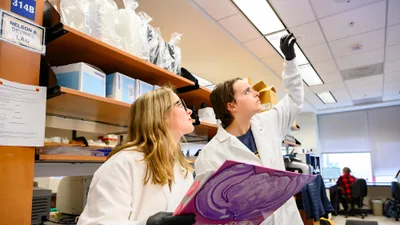A number of students beginning their academic career at WVU are embarking on a journey that no one in their families have before, becoming the first generation of their families to earn four-year degrees.
That experience comes with unique challenges for students as they make their way through an unfamiliar culture with its own language and expectations. How do I talk to my professor? Can someone help me understand the syllabus? If I need tutoring, is it free?
Take heart, though. We’re here to help. What’s more, a number of faculty in the Eberly College of Arts and Sciences had the same experience. They too were once first-generation college students excited about the future, but anxious about asking for help and speaking up in class.
Meet Hal Gorby, teaching assistant professor of history and director of undergraduate advising.
Growing up, college was something no one else in Gorby’s immediate family had ever achieved. His father worked as a skilled glass blower for many years, but when the factory closed down in the early 1980s, he had to work a variety of jobs just as Gorby was born.
“My dad subtly emphasized the importance of going to college. He always wanted me to ‘use my head’ to make a living,” said Gorby, a teaching assistant professor and the director of undergraduate studies for the Department of History. “I was also very intrigued by the idea of going to college. I did well in public school growing up, but at times found myself wanting more knowledge.”
Until his senior year at Wheeling Jesuit University, Gorby was set on becoming a lawyer. His love of history, politics and the American presidency always pointed in that direction, and a summer internship at a local law firm affirmed those goals. But while conducting research for his senior capstone, Gorby realized just how good he was at research and writing.
“During a late Friday night talk with friends, one asked me bluntly, ‘What do you really want to do?’ After a short pause, I said, ‘I want to go to graduate school for history.’ I had several friends who worked with me at the academic resource center who were also doing this, and they had slowly convinced me over the past year,” Gorby said. “I think many of my colleagues could attest to similar experiences of starting out on one track and major, and switching gears several times as an undergraduate.”
The Moundsville, W.Va. native also strives to ease the concerns of students from small towns about navigating a large university for the first time. Having found an intellectual home in history and philosophy clubs and met new people through pep band, Gorby encourages students to get involved in student organizations and activities to meet new friends.
“I often meet with students who have similar concerns to what I went through. In talking with students, I always try to let them express themselves in a way they feel comfortable, and when appropriate try to find some common ground with them based on my own experiences,” Gorby said. “I feel I am pretty empathetic when interacting with college students, and I try to make them feel as much at ease as I can.”
Dr. Gorby's advice for students
“Expect the unexpected. Your parents and other family and friends can prepare you as much as possible, but things will not go according to plan. Be flexible and realize that if things don't work well the first time, to not see that as a personal failure.”



